Sandra C. Lopez's Blog, page 387
October 30, 2014
Review: NORMAL by Danielle Pearl
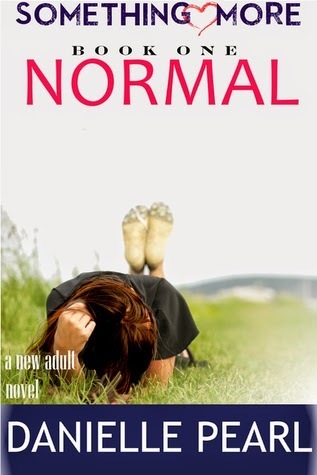 “My outfit was chosen with care for one single purpose. Not to be in, not to fit in, or to impress the in crowd. I don't want to be "in" anything except invisible. And it appears that I am.” (5)
“My outfit was chosen with care for one single purpose. Not to be in, not to fit in, or to impress the in crowd. I don't want to be "in" anything except invisible. And it appears that I am.” (5)Rory Pine has the honor of a highly coveted role: the new girl at a new school.
The best thing about Rory was her introverted yet candid personality. “I hate football players. I hate the sport, hate the people that play the sport, the people that watch it... the people who are convinced it's the most important damned thing in the world.” (5) Me, too! She was relatable in many ways.
These days, ever since her parents’ divorce, the only way Rory can seem “normal” is through the magic of her anxiety pills.
Then, on day one at a new school, of course, she runs into him. “[Sam] is a walking trigger for me. Gorgeous. My God is he gorgeous. And gorgeous guys in high school are assholes. Especially jocks. And judging by his physique, that's exactly what he is. He's tall. Built. Six plus feet of lean muscle... athletic. Something I'd have found incredibly attractive a year ago.” (7) How embarrassing it must be to have a panic attack in front of him.
But, for Rory: “I don't need him to make me feel normal. I'm not normal. And I've already accepted that I never will be again.” (11)
Still, both Sam and Rory do share one thing: to not be the target for attention. For Sam, Rory just seems real—not “normal,” just real. There is a special bond between them, but Rory can’t seem to let go of the past, no matter how much she desperately wants to. Besides she’s never been good at dating, never had any experience in it. After all, “how common can finding actual true love in high school really be?” (23) I liked that Sam wanted to be her friend and showed genuine concern for her right from the start. You can tell that he is her savior, the key to free her from her mental cage.
The majority of the story centers on the concept of being “normal,” which, according to Rory, can only be obtained by looking “happy and carefree.” Of course, seemingis not the same as actually being. “But I know better than anyone, just because they seem like some golden couple, doesn't mean it's true.” (23) Rory was convinced that everything was “normal”—the love, the jealousy, the lies, the pain. Imagery and illusion are bound to the archaic concept of “normal,” rendering truth with doubt and false insecurities. Even though broken, Rory was damn lucky to have had a friend like Cam, who wanted to keep her safe. Cam was strong, safe, and sensitive—he was just a wonderful guy!
Scenes from the past and present play side by side throughout the book, unearthing the crumbling remains of Rory’s psyche and revealing the gradual descent of her world. What happened? What was so bad that it completely unnerved and crippled her? And what on earth happened to Cam? Don’t tell me something happened to Cam! But, of course, I had that distinct feeling…
Bound and riveted, readers will want to unveil the dark skeletons as a grappling strength simmers and beckons the heroes to keep on fighting.
Pearl has written a thought-provoking and enjoyable story, albeit repetitious and emotionally daunting at times. Witty and heart-felt, Normal is a journey of self-reflection, a maze to personal fulfillment in the face of adversity, and a staggering road to recovery.
My rating: 4 stars
Published on October 30, 2014 08:11
October 29, 2014
Review: DIVERGENT DREAMS by Tony Evans
 Great stories told in 1,000 words or less to fill those times between sleeping and working. In this book you’ll learn that burying a body in the woods is difficult when you’re being haunted by a doll. You’ll discover a new underworld of humans upgrading their bodies with inexpensive electronics. And you’ll go on an adventure with Oake and discover that there is more to his meager existence than meets the eye and the path to truth is through a fruit. These and many more stories await inside…
Great stories told in 1,000 words or less to fill those times between sleeping and working. In this book you’ll learn that burying a body in the woods is difficult when you’re being haunted by a doll. You’ll discover a new underworld of humans upgrading their bodies with inexpensive electronics. And you’ll go on an adventure with Oake and discover that there is more to his meager existence than meets the eye and the path to truth is through a fruit. These and many more stories await inside…My thoughts: This is a collection of flash fiction that provides a mere glimpse into the lives of morose and disturbed characters.
In “My Soul to Keep,” a menacing doll stalks a man after burying the body of a little girl. I especially enjoyed the bleak irony in it.
“Sailing Away” is exemplary of a writer’s poetic prose to human compassion.
Divergent Dreams is open to wide interpretation with its ambiguous style and complex metaphors. At first, I thought it may have had a religious element, but then I felt that it was more sci-fi; I wasn’t sure. Obviously it had worlds where anything was possible. Quite frankly I was more puzzled than intrigued by these short tales.
My rating: 2.5 stars
Published on October 29, 2014 08:24
October 22, 2014
Review: DOING GERMANY by Agnieszka Paletta
 “Okay. So here’s the thing: if you’re a woman, you can probably relate to dreaming about a life in Paris, Provence or some charming little vineyard in Italy. Dreaming about running away, starting over, leaving and never looking back. Finding romance, adventure, yourself. (If you’re a man you’re probably wondering why in God’s name women are so banal.) Well, would you believe I made it happen? Yap, I did. Out of the blue, I dropped everything in Toronto: my job, my friends, my family and bought a one-way ticket to Italy. I abandoned my predictable life and began a new one. Just like that. I made that charming little vineyard in Italy happen. And plenty, plenty of adventure. Maybe not love, but definitely some romance. Italy was a dream. A suave, unreal, poetic dream. I highly recommend it.”—Prologue
“Okay. So here’s the thing: if you’re a woman, you can probably relate to dreaming about a life in Paris, Provence or some charming little vineyard in Italy. Dreaming about running away, starting over, leaving and never looking back. Finding romance, adventure, yourself. (If you’re a man you’re probably wondering why in God’s name women are so banal.) Well, would you believe I made it happen? Yap, I did. Out of the blue, I dropped everything in Toronto: my job, my friends, my family and bought a one-way ticket to Italy. I abandoned my predictable life and began a new one. Just like that. I made that charming little vineyard in Italy happen. And plenty, plenty of adventure. Maybe not love, but definitely some romance. Italy was a dream. A suave, unreal, poetic dream. I highly recommend it.”—Prologue Instantly I was captivated by the author’s witty, snarky, no-nonsense style. Yes, sometimes I wish could ditch the job, the boss, the responsibilities, the life in exchange for traveling the depths of the world. Oh, yeah! Hell, I wanted to read on just to find out how she did it.
The reader is given the brief highlights to how the rapid transition to Germany came about. I would’ve preferred more details to the kind of life she had before Germany, before “M” (why didn’t she give him a name? Was it a reference to Fritz Lang’s German thriller film, M?) At times, she tended to babble a little too much about trivial things, like her obsession with the dance floor or the American-European football conundrum. I found it tedious sometimes.
“No, in Europe, all the doors are open. Train, bus, tram or subway. You don’t really need a ticket to travel. It’s sort of an option. I mean, by law it’s required that you buy a ticket, validate it, and carry it with you, but by no means are you forced to do so. Nobody’s checking at any entrance points. You know how people say humans are essentially good by nature? Well, not when it comes to public transportation. Or paying taxes for that matter. Or anything else really. Who’d voluntarily pay for anything if there were no repercussions? Hence ticket controllers. People who sporadically pop-up, flash some ID and ask to see your ticket. If all you have to show is an embarrassed smile, you get fined. Hence the validation.” (13) This reminded me of my travels through Italy. Yes, that’s how it is alright.
Written in a diary format, this memoir depicts the various wacky adventures on a foreign land. Every day was a learning experience, like how you get packages from the post office or the revelation of chocolate yogurt at the supermarket. Although flaky at times, the main character was admirable in the sense that she never stopped trying to learn. Does anyone really, especially in a foreign country? I mean, there’s the language alone that you have to learn. And why was Italian easier to learn than German? I stayed in Italy for 3 months and I didn’t pick up the language not one bit.
“It was my first job after university. I was sort of a managing editor and a publishing assistant and a circulation manager and a secretary too. You know how small businesses work, right? But I grew disillusioned with the job, with love, with my life. One day I was just staring out the window and it hit me: I can leave! I don’t just have to dream about it, or watch movies about how others do it. I can do it! I can go anywhere in the world and start over! Find adventure and love! Find the meaning of life! (I was a bit of an idiot, of course. Or to put it affably, a young and naive romantic.)” (49)
“The concept of “home” was rather a confusing one for me. I’d been skipping countries for the past ten years. What defines “home” anyway? Where you live? Where you feel comfortable? Where you keep most of your underwear?” (39) You can’t help but enjoy the author’s boisterous humor!
The writing itself was average at best. Overall, I found this book to be quick and easy to relate to.
My rating: 3.5 stars
Published on October 22, 2014 08:58
October 20, 2014
Review: PAPER DOLL by Joe Cosentino
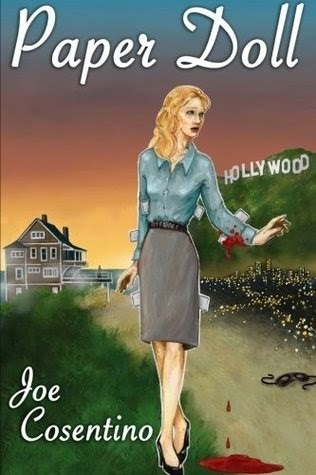 Jealousy, resentment, anger—all were combined to grant Bette Davis a stark, chilling presence in Whatever happened to Baby Jane, a simple psychological thriller that gave the horror genre a brand new name. Totally awesome! Surely inspired by such films, Paper Doll was a story I was definitely looking forward to reading.
Jealousy, resentment, anger—all were combined to grant Bette Davis a stark, chilling presence in Whatever happened to Baby Jane, a simple psychological thriller that gave the horror genre a brand new name. Totally awesome! Surely inspired by such films, Paper Doll was a story I was definitely looking forward to reading. Jana Lane is a former child star plagued by haunting memories of her time in the spot light.
“Back then . . . I was under a great deal of pressure. From the time I was six years old until I was eighteen, I did two films a year and went to classes on the set. I enjoyed the make-believe . . . playing so many characters in so many different locations. But the movie business is a business. An entire studio relied on me to deliver audiences—film after film. Not only the studio boss, Mr. Cavoto, but a great deal of people’s livelihoods depended on the success of my movies—producers, directors, writers, actors, publicists, costumers, set and lighting designers, sound engineers, camera operators, and makeup artists . . . to name a few.” –Jane Lane (13)
Now that the pressure was off, Jana could enjoy her time, her family, and her wealth. But nothing was ever easy. She kept on seeing images of her past, re-living that horrible incident at the studio; she kept on seeing the man in black.
Who could this stalker be? With all the crazed fans—fans still following Jana, wanting to be close to her, to touch her—it could be anyone. And what about her sanity? Could she be imagining all the strange, eerie things that have been happening?
Confusion clutters poor Jana’s mind, but still she trudges on, digging deeper and deeper, trying to gather the broken puzzle pieces from that incident and uncover big secrets—secrets that may tear Jana apart.
With his in-depth knowledge of the film industry, Cosentino weaves an intricate tale of tantalizing mystery and emotional turmoil. Taking the reader on a long, arduous journey through a child star’s past, he reveals the incredibly insidious show behind the stage curtains. Reading it will make you feel like you’re watching a 1930’s movie, resplendent in its classical theatrics and notable effects. At times, it became a little daunting, especially when the POV kept changing and the past-present kept switching back and forth in the same paragraph.
Well-written and enjoyable!
My rating: 4 stars
Published on October 20, 2014 08:13
October 16, 2014
Review: PHONING HOME by Jacob Appel
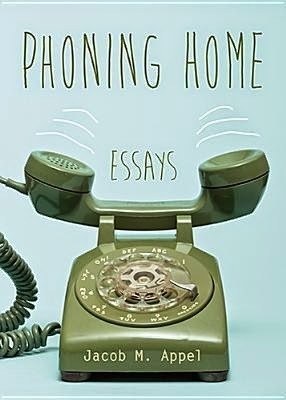 This is a collection of academic essays.
This is a collection of academic essays. In “Phoning Home,” Appel evaluates the acts of misbehavior—what drives the act and the effect on a person’s character. He states that “past performance is no indication of future unreliability.” (11)
Author cleverly recounts childhood memories and the lessons—both joyful and cruel—that were bestowed upon him. He was like Kevin Arnold of The Wonder Years with a PhD. Full of humorous anecdotes.
In “The Man Who Was Not My Grandfather,” the author challenges his feeble grandmother to ponder what would have been had she gone through with the arranged marriage. His best theories were in “Sudden Death—A Eulogy,” an essay scrutinizing “sudden” death.” “Six decades after Great Grandpa Simon plunged off his mortal coil, sudden death now threatens to go the way of rotary telephones and passenger pigeons. The exact rate at which we are not dropping dead is difficult to calculate.” (63)
“I made the mistake of observing to my date that Ms. Hager was ‘drop dead gorgeous.’ My date replied, acidly, ‘in that case, keep staring.’ Needless to say, as forcefully as I ogled, my heart beat only faster; it did not stop. ‘Drop dead gorgeous,’ of course, means far less in a world where people don’t actually drop dead…We can speak figuratively about sudden death, trivialize it—even joke about it—because we do not actually expect to confront it. Not now, not soon, not until we’ve been afforded ample time to prepare.” (64)
“What we can do—and what we have not been doing—is paying closer attention to the complex ways in which how we die is transforming how we live. I fear the most subtle, yet pernicious, consequence of a world in which people do not as often die suddenly is a world in which people do not appreciate life.” (68)
Riveting and compelling, these compositions are witty and intelligent; they are thought-provoking and insightful. Appel eloquently writes with craft, logic, and reverence.
“What my students have never done, however, is reflect upon a life without toys. In a society where mass-produced plastic action figures cost ten dollars a piece and every middle-class family has a closet well-stocked with such wholesome board games as Monopoly and Risk, my students find ‘toylessness’ as alien as homelessness.” (20)
At times, the concepts were foreign and complex. I didn’t understand the Jewish terms, and not every story was interesting. Jacob Appel is a giant, walking brain (physicist, attorney, bioethicist, professor.) He will take you back to the school of Critical Thinking.
My rating: 4 stars
Published on October 16, 2014 08:54
October 15, 2014
Review: MOM CON by Karl Fields
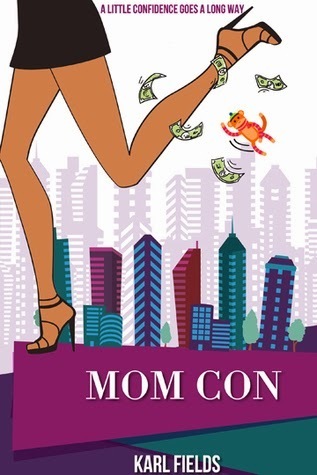 Meet Anita Henry, a hard-working, single mom trying to launch her own business after losing her job. To top it all off, her ex-employer is suing her for stealing company secrets.
Meet Anita Henry, a hard-working, single mom trying to launch her own business after losing her job. To top it all off, her ex-employer is suing her for stealing company secrets. Corporate espionage? Please. Her single greatest offense was a high school fashion felony. But when a shady court ruling forces Anita to cease and desist, she's determined to get revenge.
My thoughts: “My people are usually the wait staff, but if the white girl wants to serve the Mexican girl for a change, who am I to complain?” –Renee (4)
Chris, Renee, and Anita are the great trio. They are part of the unemployed pact with big dreams yet to be fulfilled and little mouths that constantly need to be fed. Pinching pennies is something Anita knows all too well. To top it all off, she’s also getting zilch from her cheating ex-husband and she’s being sued by her former boss. Nice, huh?
“In every company, there are workers and visionaries…You three ladies are workers…But I’m a visionary. I see the big picture. It’s my job to see where the company is headed and plot a path to make sure it gets there…Not everyone is cut out to be a CEO.” –Anita’s Former Boss (13)
Well, that’s just all but daring them to get their product idea out and finally start their own business.
“We’re smart, we’re good at our job, and we’re all good people. But when it comes to doing the dirty work, we don’t have a clue.”—Anita (21)
Yep, getting your hands on people’s money might be a lot harder to achieve.
Quick and easy to read, the story is infused with likable characters along with witty commentaries about the economy and the cruel business industry. You can’t help cheering on as Anita fights the shady dealings of a music producer; you can’t help being on the brink of tears when she discovers her car was stolen and destroyed beyond recognition at a chop shop. Fields created such relatable characters that you’ll laugh and cry along with them. All the drama concerning the kids didn’t appeal to me so much. No doubt about it that kids are very hectic—that’s why I’m glad I don’t have any. There was also a giant mystery concerning this “con” Anita and her crew were going to pull. What were they going to do exactly—kill the boss or beat him at his own game? I was suspecting it to be the ladder as their efforts concentrated more on getting the business started using little resources and funds for M.O.M. Con (a parenting convention.) Perhaps I anticipated a comedic ploy similar to the Dolly Parton movie, 9 to 5. Instead Anita was like Diane Keaton in The First Wives Club—intelligent and reserved while also cunning enough to make them (her boss, her ex) pay. Like they said in the movie, “Don’t get mad, get everything.”
A good story for those hard-working, fast-moving, single people with no money, a lot on their minds, and the strong will to survive. You don’t have to be a mom to enjoy this book!
My rating: 4 stars
Published on October 15, 2014 08:38
October 13, 2014
Review: HOW TO NAVIGATE ZOMBIE CAVE AND DEFEAT PIRATE PETE by Mick Bogerman
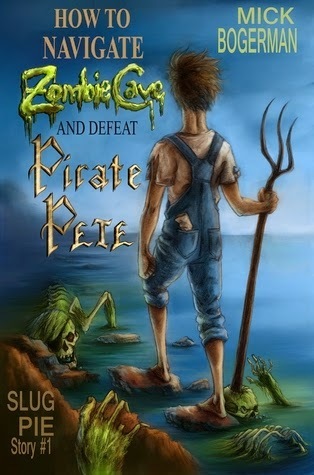 Armed with a pitchfork, miner’s hat, and map, Mick Bogerman dares to hunt for pirate treasure in Zombie Cave. His little brother Finley is tied up at the beach. Literally--Mick tied him up. No one needs a little brother tagging along when you’re going to slay the undead.
Armed with a pitchfork, miner’s hat, and map, Mick Bogerman dares to hunt for pirate treasure in Zombie Cave. His little brother Finley is tied up at the beach. Literally--Mick tied him up. No one needs a little brother tagging along when you’re going to slay the undead.But Mick soon wishes he’d taken some human company with him, because lurking in every corner, reaching from every crevice, is another hungry corpse. No wonder the place is named Zombie Cave! And finding treasure in the twisty tunnels is a lot harder when your map disintegrates. And man-oh-man the cold, dark tide chases fast. But the worst part about fighting off ravenous flesh-eaters is the one monster deadlier than a regular zombie . . . the worst of the worst . . . Pirate Pete.
My thoughts: The story is told in the POV of Mick, a wildly imaginative, crafty, and courageous young hero. Each chapter is a step to navigating the dark cave and detailing every rigorous, disgusting task to finding the treasure. It was gross, but not scary—just right for kids.
Reading this filled me with nostalgia, recalling those Goosebump books I read as a kid. The language was colorful and descriptive, but it was also clean and relatable to most 12-year olds. Story was simple, quick, and fun. I may not have been 100% into it the entire way, but it was a cute adventure story.
I look forward to more Slug Pie stories.
My rating: 3.5 stars
Published on October 13, 2014 09:21
October 10, 2014
Review: BLUE LIGHTS by Hollow Frazer
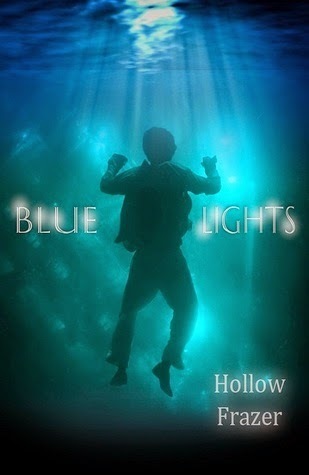 Trapped in blank cell with no escape, the white of the walls so bright that it hurts your eyes while the chains on your feet bite against your ankles. For Morgan, there was nothing scarier or more confusing.
Trapped in blank cell with no escape, the white of the walls so bright that it hurts your eyes while the chains on your feet bite against your ankles. For Morgan, there was nothing scarier or more confusing. The bulk of this short story was set in this one dank and depressing room, where panic ran wild and hope had no space. Life seemed to be slowly draining out of Morgan’s body. Then an apparition appeared before his eyes. Was he delirious or was this real?
“This is real Morgan. I am neither a trick of the mind nor an illusion of some drug. In this world, between life and death, I am either your ticket to survival in a world that your blood-stained hands have destroyed or death to a hell where you will be destroyed.” (5) Oooh, chilling!
For the most part, the reader is kept in a hazy blackness of confusion. Random names kept popping out of Morgan’s subconscious as he battles to break free from his prison. Who were these people? And why was it called “blue lights” when there was none? It was mostly white.
Even with these lingering questions, this was a poetically well-written account of that agonizing moment of insanity before death. Personally, I think this short story would be better as part of a collection so we can learn more of this character, his life, his past, and, more importantly, what he did and why he did it.
My rating: 3.5 stars
Published on October 10, 2014 09:24
October 8, 2014
Review: AND THEN ALONG CAME RUDY by Sam Schichter
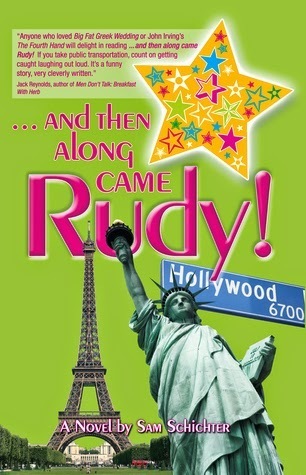 “Welcome home, Rudy!”—words of hopeless discouragement for our main hero.
“Welcome home, Rudy!”—words of hopeless discouragement for our main hero. Can you blame him? He fled to magnificent Europe to write the great American novel only to return with not even a letter written to his mother.
“Mornings, I would walk up and down the alleyways, through the grand avenue, past the impromptu marketplaces, searching for colourful episodes to put in my novel. But I soon became disillusioned, as well as bewildered. Disillusioned because I was not writing anything of value; bewildered because there were too many of my kind in Paris. Too many would-be Hemingways. I felt they were crowding me. Not letting me be an original. So I decided to push on. But where? Opening up my map of Europe, I skimmed through the countries. Belgium – only has waffles to offer. Holland – too many canals. Norway – too cold. Luxembourg – too small. Spain – too sunny. Italy – too much tutti-fruity art. Greece – too many ruins. Germany – too... too... German? Mozart Germany? Schiller Germany? Concentration camp Germany? No. I couldn’t. My father wouldn’t forgive me. My mother would think I had completely lost my mind.” (7)
I wouldn’t imagine that I’d be able to get through a family dinner with all the constant bickering over the war, the mistreatment of Jews, and how I was making nothing of my life. The problem was that everyone saw him as this unrealistic, guileless simpleton—a “kid with the head in the clouds.”
“I knew then and there what I wanted to do with the rest of my life. God, to be able to write like Salinger!” (39) I totally related to his desire to be a published author, although perhaps he was being a bit naïve thinking he could be a millionaire with it. His dream was to be a best-selling author, and when he received the feedback from the publisher, he got a wake-up call.
It won’t sell.
“What was I to do? Nine months of my life gone down the drain. Nine months of anguish, frustration, fatigue and wavering nerves. Nine months of dreams, hopes and prayers all washed away. Nine months from conception to birth, and now a last minute miscarriage. My baby was dead. How could this be possible? This was to be the all-time best seller. More sales than the Bible. One hundred weeks on the New York Times best-seller list. A Pulitzer prize. A movie. And then the Nobel Prize for Literature.
Why had I made all the sacrifices? For a jackass named Edwin Plaster to tell me that romanticism doesn’t sell? In ten minutes E.P. told me that nine months of my life had been spent on romantic bird dung. I just didn’t understand. What should I do? Spend another six months rewriting and then be told by that rotten publisher that my book is unsellable? Damn you, Edwin Plaster. Damn you to hell and beyond.” (35)
If Nanni Moretti (Caro Diario) was considered the Italian Woody Allen, then Rudy was the Polish Nanni Moretti with his fast talk fueled by sardonic remarks and humorous quips. At times, he tended to babble and swerve off tangent. Did he really need to be so repetitive and redundant? Perhaps he was trying to bring his nervous breakdown to life by making the reader have one too. And can you blame him with being surrounded by the constant drone of neurotic characters? Nonetheless, even with the mild distraction of tedious back-and-forth dialogue (particularly during the court scenes,) Rudy eventually brings you back to the story with his hilarious outbursts. I loved the part when he’s trying to navigate through the congested Hollywood traffic, trying to get to an audition that closes in like 20 minutes. Yeah, he should’ve left sooner rather than lounge around the beach for a tan. And, of course, the reader will thoroughly enjoy his floundering attempt to be a porno actor.
Witty and frank, this novel illustrates the aimless journey of a man battling the hazy equilibrium between his fantasies and the reality. What Schichter may not realize was that, on some level, he doeswrite like J.D. Salinger.
My rating: 4 stars
Published on October 08, 2014 08:18
September 26, 2014
Review: A NATIVE’S TONGUE by Michael Dennis
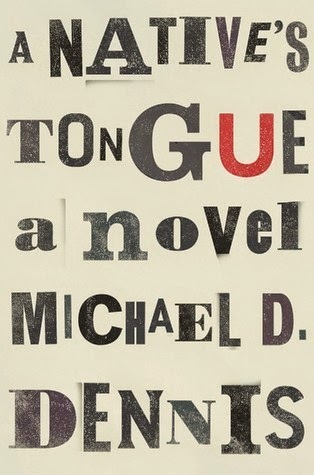 In Michael D. Dennis’s touching new novel, A Native’s Tongue, a young man, torn between two women, struggles to find his way in the world.
In Michael D. Dennis’s touching new novel, A Native’s Tongue, a young man, torn between two women, struggles to find his way in the world.Charlie Winters has never been an overachiever. He is used to just getting by while living with his single mother and working a dead-end job at a cheesesteak stand. Meanwhile, he’s constantly grappling with the voice of his sister, who died in a tragic car accident years earlier, echoing in his head.
So when Violet, an older woman, sets her sights on Charlie and refuses to let go, he follows along. He soon finds himself immersed in a destructive relationship that still fails to fill the void within him.
But then he meets Jennifer, a mystical young woman whose energy and life convinces Charlie to pursue her, even through the darkest corners of Los Angeles, and sets their lives upon a path that can’t be stopped.
My thoughts: “Did the endless portrayals of love and romance in novels really exist?” (6)
Each chapter relays the POV of each character. It was odd that some were written in the 1stperson and others were in the 3rd person. The chapters with Charlie were in 1st person Pre-Violet/Jennifer; and the chapters with Violet and Jennifer were in 3rd person Post-Charlie. Sometimes the POV would switch within the same chapter, but it wasn’t at all confusing. The enticing part was the mystery in the Post-Charlie segments that begs to answer the question: What happened to Charlie and how did Violet end up in prison?
The whole story mainly revolves around Charlie and his battle with loneliness, depression, and substance abuse. He was never able to deal with the loss of his sister. “After her death, time disintegrated. Each second pulsed through my body in passing immobility: my lungs ceased to expand and I curled like a contortionist in the circus of my own dreadful reality. I was a captive to this pain and the memory. All I wanted was for death to inject me with a taste of its poison.” (42)
The author takes the reader on a wild ride through L.A.’s seedy underside paved with deception and debauchery. “For some reason, few people even believed dying was possible in this city. The fountain of youth flowed so freely that no one ever talked about lying down in the earth forever…In my opinion, there were those of us who feared death, those who had experienced it and still feared it, and those, like me, who welcomed its presence.” (59)
Charlie was trapped in the hard clutches of Violet when he meets the fragile, innocent beauty, Jennifer. It was sad how he got dragged away without knowing her name. This scene was tragic and lovely—almost Shakespearean.
Poor Charlie couldn’t stand Violet, a manipulative, cold woman. “How does someone own a human being? How was it possible to capture a human spirit? My body had separated and my spirit had gone somewhere, wandered off into a distant space, like a specter or wraith. I was owned. My body belonged to someone. She had taken what was, innately, the only real property I had.” (77)
Charlie is a lost, sensitive soul. He may seem like any other young, arrogant douche bag, but his heart resonated a soft empathy. Charlie’s love for Jennifer was enigmatic; it was definitely a love taken from the pages of the Dark Romanticism era—everlasting and naïve.
The ending, of course, left me with puzzled unfulfillment. I didn’t understand the reasoning behind it or what exactly happened. On top of that, I didn’t get the meaning of the title: A Native’s Tongue. That was a head-scratcher.
Captivating and well-written! Sprinkled with dark humor, the story contained a mixture of emphatic beauty and brutal sensitivity.
My rating: 4.5 stars
Published on September 26, 2014 07:59



